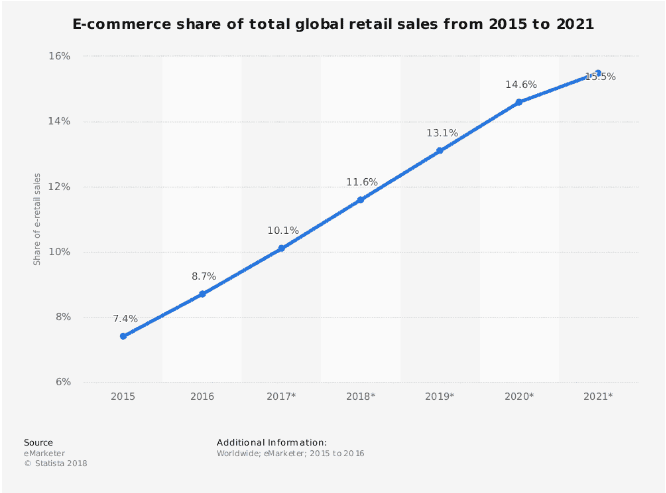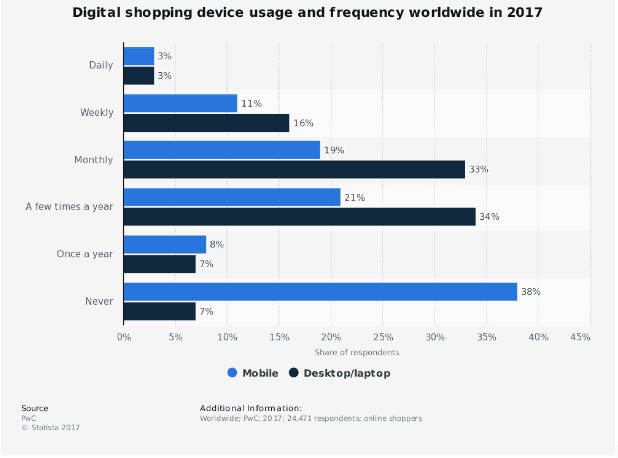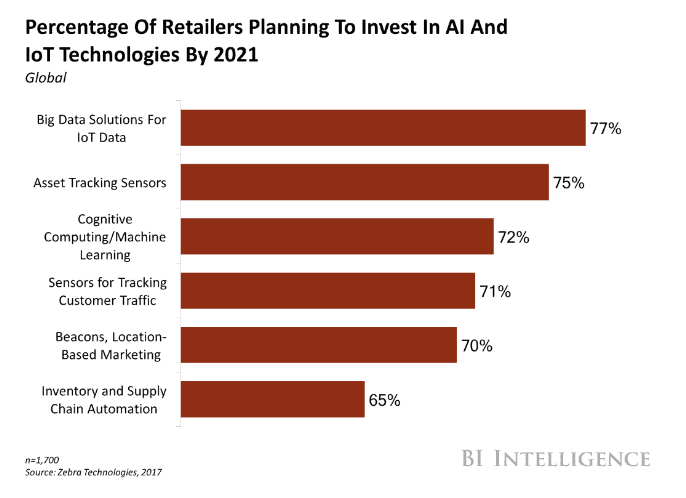With more than 6000 brick-and-mortar stores closed in 2017 in US alone, according to Fung Global Retail & Technology, specialists predicted a “retail apocalypse”. However, according to Statista, e-commerce represents nearly 19% of the total retail globally and is expected to grow close to 25% by 2026, so there’s still a lot of room for growth.

In 2017, 58.9% of the retail e-commerce sales worldwide came from mobile devices, with 11% of online shoppers using their smartphones weekly for purchases. So not only are we buying more and more online, but we are buying on the go.
PwC also conducted a study which revealed that 35% of online shoppers say their smartphone will become their main purchasing tool, while 39% use social networks to get inspiration for purchases. Those figures could increase even further if consumers weren’t afraid of hackers – 65% of online shoppers fear their personal information might be hacked if they use their smartphones for online purchases.
A new study recently revealed that online shopping usually takes place over a desktop computer, though mobile isn’t lagging too far behind, at 45%.
Some people simply don’t like buying things, and doing it online removes all those awkward interactions. 78% of people shop online to avoid waiting in line. There are no aggressive salespeople breathing down your neck and trying to convince you to spend your hard-earned cash.
All of this shows that e-commerce is growing at a dizzying pace and is expected to reach $4.5 trillion by 2021. Companies like Amazon understood early on that this growth rate cannot be sustained by humans alone, so they have invested in an alternative – artificial intelligence.
Today, more and more e-commerce companies try to integrate AI into their strategies, and Gartner predicts that by 2020, over 80% of all customer interactions will be handled by AI.
Let’s see how AI will impact e-commerce.
Improved Search Results
Many shoppers use the internal search function of an online store’s website when they are searching for products, but the items returned are not always the most relevant because of various reasons: there is no exact match, the customer is not very sure what to search for, typos etc.
Customer satisfaction is of utmost importance for e-commerce businesses because an unsatisfied customer will not only leave the website without making a purchase, but most probably won’t (ever) come back either. And this is where artificial intelligence and machine learning can help!
Up until now, the internal search engines used algorithms made by humans, which are obviously not very good at personalizing search results for each customer. There are way too many variables to consider, which can lead to an infinite number of possible scenarios. But machines don’t have that problem.
Using natural language processing, the system can determine what your customer really wants to find. When you combine that with machine learning’s ability to analyze behavior and learn from past experience, you will be able to always return exactly the items your customer is searching for. It’s like you are suddenly able to read your customers’ minds – and who doesn’t want that?
But you can take improving search results even further and use visual search.
Visual Search
Like we said before, customers don’t always know what they want, so being able to use images instead of keywords really does come in handy.
Visual search is not necessarily a novelty – Google and Pinterest have used similarities between different pictures for recommendations for a few years now. But things are about to get even better! Building on top of its Related Pins feature, Pinterest has come up with a new service – Pinterest Lens.
Lens uses an image-detection algorithm to identify real life objects and find them online, which really simplifies the acquisition process for the customer and thus helps increase conversion rates.
“For shopping specifically, improvements to online discovery means new ways to find products you’re interested in but may not have the words for; visual discovery gives people a way to discover new brands and ways of styling that they never knew existed.”
Andrew Zhai, Pinterest Engineer
E-commerce websites have already begun to buy into this trend: Etsy has acquired Blackbird Technologies to apply their image-recognition and natural-language processing to its search function, while Amazon is re-purposing the AI technology developed for their Web Services for their new Amazon Go grocery stores.
And that’s not all! Adobe has developed an image-editing tool that can turn sketches into realistic images that you can use for a visual search.
Intelligent Marketing Campaigns
The most successful marketing campaigns are those that don’t make you feel like you are being sold something. The trend these days is not only subtle marketing messages, but also personalization, as nearly 74% of online consumers get frustrated when they are presented with irrelevant content. By using AI, e-commerce companies are able to have a more meaningful interaction with their customers.
The algorithm can analyze customer behavior before, during and even after purchase and learns which customers are most likely to buy certain products. This is extremely helpful for sales teams because it helps them overcome business challenges.
Amazon and Netflix were among the first companies to implement this strategy. Amazon increased its sales by 29% after it introduced product recommendations to its customers, while Netflix has hit a 75%-win rate after it started using AI technology to recommend shows.
But recommendations can be used for items that are not similar or complementary too. For example, it can be used to reduce the time between repurchases of the same item.
Athletic apparel maker Under Armour is using user data gathered through their four fitness apps to determine wear of shoes, taking into account location and frequency of use. This way, they know exactly what types of shoes to recommend and, more importantly, when.
Better Segmentation and Targeting
Big data has eliminated the need for cold calls. Companies are now able to identify quality leads and focus only on individuals most likely to buy their products. 89% of marketers use predictive analytics to improve their sales ROI now, according to Forbes.
However, more than 33% of marketing leads are not being followed up with by sales teams, says AI software firm Conversica, mainly because businesses are not able to cope with the unimaginable amount of customer data. And so, lots of potential customers are lost before they get a chance to make a purchase.
AI assistants can be used instead to take on the boring work: reach out to leads, follow up and engage in initial conversations to determine interest before they are passed to a human. This frees up lots of time for the sales teams and enables them to focus only on qualified leads.
You can even take it a step further and integrate AI into your CRM. Using natural language learning and voice input, your CRM will be able to answer customer queries, solve problems and even identify new sales opportunities.
Optimized Prices
Tools that can collect information about your competitors’ prices and demand for different items are already on the market. But AI can help you take full advantage of this information by combining it with data about user behavior to determine the best price for a product. After all, the price is the one thing that influences the success and profitability of a product the most.
Conclusion
Artificial Intelligence will drastically reshape e-commerce and the changes we’ve seen this far are only the beginning. As the technology develops, we will notice two main trends: e-commerce will become more and more automated, but at the same time, the experience will become more natural, engaging and personalized.
Author Bio
This article has been contributed by Valentin Radu, author, speaker and serial entrepreneur, currently, the CEO of Omniconvert.com, an all-in-one conversion rate optimization tool that enables online marketers to easily create A/B tests, online surveys, website overlays, advanced segmentation and more.








